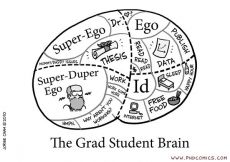Wisdom
7 Tips for Applying to a Psychology PhD Program
The unwritten rules that I wish I knew
Posted January 7, 2015
I just sifted through this year's batch of graduate student applications to the clinical psychology PhD program at George Mason University. Here are the emotions that I experienced:
Awe - reminded that if I was applying to graduate school with my 1998 packet, I would never get in. There are some psychology obsessed youngbloods out there.
Elevation - ignore the pessimism in the news, a vast number of hungry characters are coming through the pipelines to improve society. They are already making inroads and want a PhD to give them extra leverage.
Anxiety - the pressure to get near perfect grades, near perfect standardized test scores, and intensive research and clinical experience is palpable. I often wonder how many of these characters pause to enjoy their once-in-a-lifetime college years. I remember reading The Fountainhead on a bench in the middle of campus at 2am on a random Tuesday while the Ithaca snow rained down in slow-motion. Sitting across the quad from me was a muscular guy reading The Celestine Prophecy. The two of us talked about books, women, society's expectations, and the hero's journey for hours. This is the kind of intimacy that creates life long bonds, raising the bar for how strangers should communicate. Then there was the time [insert dangerous, naked, and/or drunken story #4-103]. I never thought about graduate school while attending Cornell University. I lived day-to-day, semester by semester. Not today's graduate school applicants....
Dismay - as someone who takes mentoring seriously, I am disappointed to read poorly constructed applications. Everybody should have a high quality mentor who points out problems before that submission button is pressed.
Inspired - I wish somebody offered me inside information on what professors really care about when they read an application. Because I have a natural distaste for authority, I feel compelled to provide this information to every student aspiring to be a psychologist.
With these emotions in tow, here are my seven concrete suggestions for those masochistic enough to apply to a PhD program in clinical psychology (this will also be relevant for other graduate programs that emphasize science). A strong clinical psychology program will reject more than 90% of applicants. The odds are against you. This post has been designed to improve your odds.
Caveat: the wisdom below is relevant to working with me and many of my colleagues who are interested in training psychological scientists. Professors are not a homogeneous group. Some possess a value system where they will weight criteria differently than I do. Use this information in whatever manner works best for you.

whatever manner works best for you.
Wisdom #1. You will not get an interview without direct research experience. This was not the case 10 years ago. We know that undergraduate courses are required and many universities allow you to retake courses until you get the desired grade. For this reason, grades matter little (get over a 3.2 GPA and I am ready to treat you no differently than someone with a 4.0). Now an honor thesis is optional. Completing one shows dedication, discipline, and devotion to science. Gaining research experience in a professor's laboratory is behavioral evidence that you know about sweat equity and the delay of gratification. My advice is that it is better to aim for an A- in your courses if it means that you can dedicate more time to assist in research with a scientist and eventually conduct studies under their guidance. Nothing in the classroom approximates the skills, knowledge, and psychological strengths that you develop with hands-on research. Nothing.
Corollary - Don't waste your time accruing a wide breadth of experiences unless you are doing it as an end it itself. I don't care if you are vice-president of Psi Chi, a volunteer fire fighter for 6 hours per year, and created the first cultural neuroscience book club at your local library. I am more impressed with hardcore dedication and deep penetration in one activity (where somebody can speak to your invaluable contributions) than a lengthy curriculum vitae (CV). In a similar vein, I don't care if you obtained authorship on multiple journal articles. To me, this says that you work with generous people. One first author poster presentation where you did the bulk of the writing, analyzing, and conceptualizing is all I need. Aim for quality and depth.
Wisdom #2. It does not matter where you go to college. Ignore guidance counselors and well-meaning parents that argue for the edge afforded by those with an Ivy League education (and those schools that make the capricious top 25 in the latest US News and World Report rankings). I only care about what you did and whether you can hit the ground running in my research laboratory. This year alone, I sifted through applications from Armstrong Atlantic State University, Samford University, Wofford College, and Help University. I never heard of any of them. What I care about is that you can write, possess superior critical thinking skills, and know the agony and ecstasy of following through from a fetal research idea to the initial analytical tests to the interpretation of these results and finally, the dissemination of this work to the world. Don't spend extra money for badges and stars. Spend your time in a research laboratory to understand psychological science.
Wisdom #3. If you suck at taking standardized tests, take them as many times as you can. This shows me that you are determined. This shows me you care about verbal, quantitative, and analytical intelligence and you are pissed off that the GRE fails to capture yours (which is often the case). Take it once, fail, quit and what I infer is that you are unequipped to handle setbacks. The life of a psychological scientist is littered with setbacks and failures. I want somebody who can be counted on when the stakes are high and the probability of success is unknown. Show me you are that person. Don't tell me, show me.
Wisdom #4. Be interesting. When you sound like a walking, talking scientific article, you are uninteresting. Be a human first. The best way to be interesting is to live an interesting life. Exotic people. Exotic places. Cultural Immersion. A willingness to be vulnerable. Strange experiences. Anxiety provoking experiences. To be psychologically minded and ask great questions, you must truly live. I remember an applicant several years back who at the end of her CV listed the 18 countries she visited. That one bit of information gave the extra edge that landed her an interview. After all, that much travel should give you an interesting lens to view the complexity of human behavior.
Wisdom #5. You don't need three amazing letters of recommendation, you need one. You must cultivate a relationship with one person who understands what you have done in psychology and more importantly, what you strive to become. Find a great mentor and work hard at forming a strong relationship. Show them what you can do. Ask for experiences and tasks that are beyond your skill level and then deliver - over and over again. You want one person to be able to say that you are one of the top 3 people they have ever mentored in an important skill set - writing ability, critical thinking, work ethic, creativity, teamwork, etc. Show somebody what you are capable of doing and make sure that it is visible to them. When I talk to my colleagues at conferences, I ask them about students who might be applying to work with me. Conversations with trusted colleagues are persuasive. I want you to know that these conversations happen. So be a good colleague. Be trustworthy. Be autonomous. Ask questions when you don't know something. Seize opportunities. Ask for opportunities. Repair relationships when needed. Be the type of person that somebody can speak highly of at all times. You never know when these backchannel conversations are going to happen.
Wisdom #6. Showcase your uniqueness. Avoid clichés of how psychology is your life's passion (you are just getting started and don't know yet). If this is true, tell a story (show me, don't tell me). When asked what separates you from applicants with perfect GRE scores, a 4.0 GPA, and two years of research experience, do not state that you work harder (72 applicants will make the same claim). Do not mention that the origin of your interest in psychology was the psychological problems of relatives or the social difficulties faced during teenage years (we all need to be loved just like everybody else does so move on). You possess a configuration of strengths and weaknesses that inform a life history and perspective unlike any other human being. Learn how to tell a compelling, emotionally engaging story about how this informs your potential. I am more interested in your potential than your past. Do not be afraid of marketing yourself. Sell me on your potential.
Wisdom #7. Do not lie. Almost every applicant says they want to be a scientist because they think this is what PhD programs want to hear. Pretend that you are uninterested in clinical practice and you will despise graduate school with me. Lying about your interests will hurt your experience in graduate school and the mentor that selected you from an impressive pool of applicants. Be honest and find the best mentor match. You only get trained once. Make it count. Show integrity. The field of psychology is small and relationships matter.
The goal of the admissions process is to find the best people for the exact mentors available at a specific program. The hope is that the relationships that develop will last far beyond the five years of graduate school. How you get trained and by who matters. I hope the information in this blog post will help your journey. Keep me posted on your accomplishments.
Dr. Todd B. Kashdan is a public speaker, psychologist, and professor of psychology and senior scientist at the Center for the Advancement of Well-Being at George Mason University. His new book, The upside of your dark side: Why being your whole self - not just your “good” self - drives success and fulfillment is available from Amazon , Barnes & Noble , Booksamillion , Powell's or Indie Bound. If you're interested in speaking engagements or workshops, go to: toddkashdan.com




